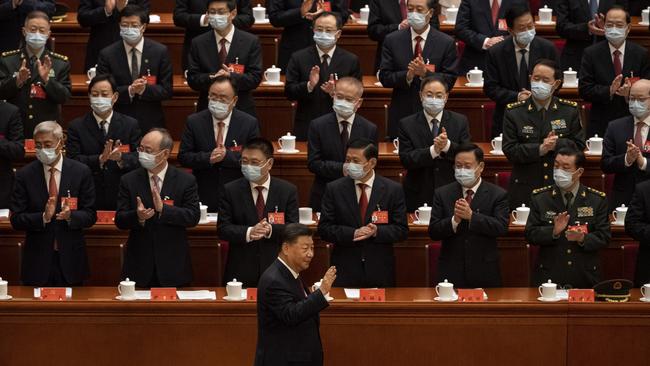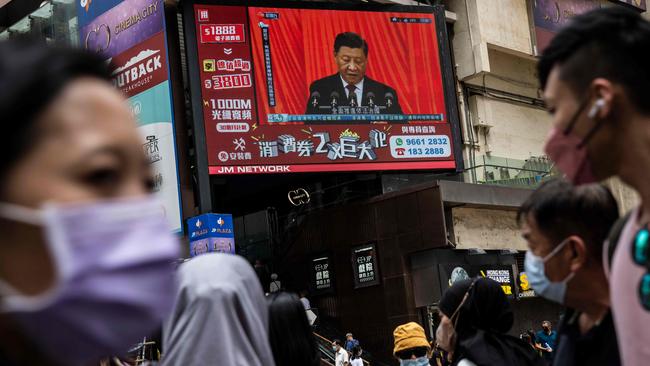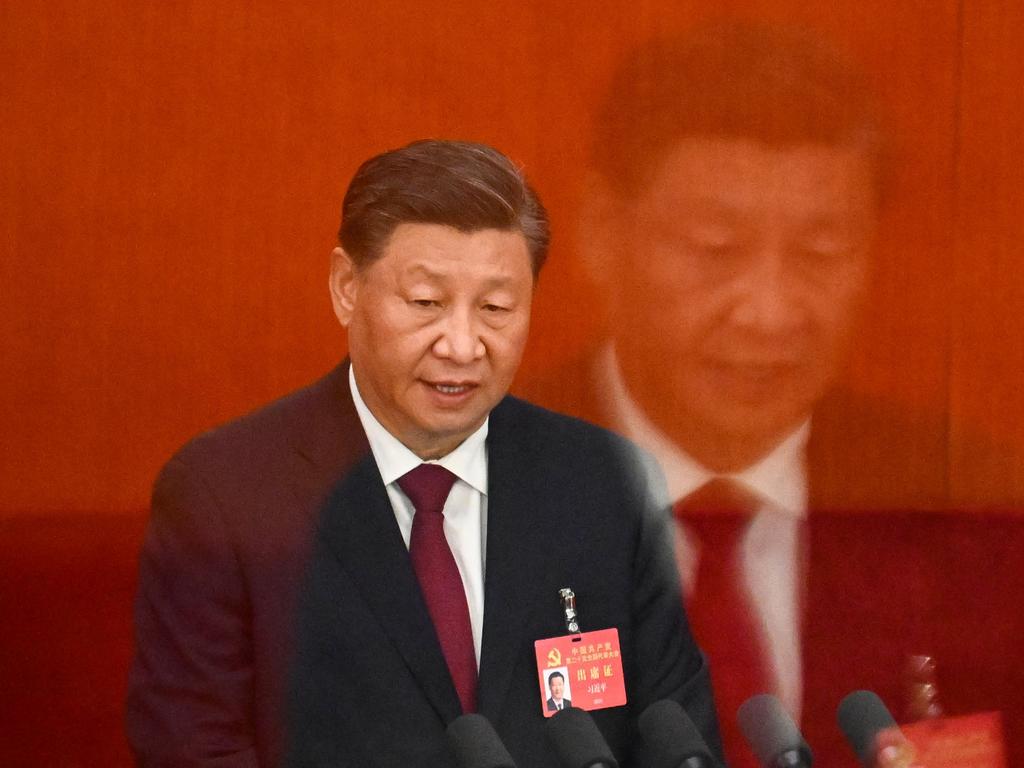Why another Xi Jinping term might be in US’s interest
Consensus among Western experts is that China’s long-term prospects have, on net, suffered under Xi, so an extension of his reign could benefit the US – at least in an economic sense.
American leaders once wanted China to be rich: “strong, peaceful and prosperous,” as President George W. Bush said in 2002; “strong, prosperous and successful,” as President Barack Obama said in 2009.
Times have changed. In the last 10 years, the US has come to see China as a competitor rather than a partner, bent on displacing the US as leader of the global economic and geostrategic order.
This has two somewhat unsettling implications. First, while the US doesn’t want China to be poor, it is no longer as supportive of it becoming rich – since this would make it a more potent competitor.
So while the Biden administration says it isn’t trying to contain China, its sweeping new restrictions on Chinese access to semiconductors, equipment and talent have that intent. The restrictions go beyond simply maintaining a US technology lead to “strangling large segments of the Chinese technology industry – strangling with an intent to kill,” wrote Gregory Allen of the Center for Strategic and International Studies.

Second, the consensus of Western experts is that China’s long-term prospects have, on net, suffered under Chinese leader Xi Jinping, so a third term, which he is expected to receive at the end of the current party congress, could serve US interests – at least in an economic sense.
This turn of events can be traced to the transformation in American attitudes toward China. Until around 2012, successive US presidents thought engagement would make China more politically open, more market driven and more invested in the rules-based international system the US had nurtured since the end of World War II.
Since Mr Xi took office in 2013, those hopes have withered away and a darker view has arisen: US engagement was doomed to fail.
This view is advanced by Michael Pillsbury in his book “The Hundred-Year Marathon: China’s Secret Strategy to Replace America as the Global Superpower,” which was influential during the Trump administration, and by Rush Doshi in “The Long Game: China’s Grand Strategy to Displace American Order.” Mr Doshi, a political scientist at Yale University, is now serving on President Joe Biden’s National Security Council.
The thesis of both books is that the Chinese Communist Party has always seen itself in a long-term struggle with the US for ideological and geostrategic hegemony. Mr Doshi quotes Jiang Zemin, president from 1993 to 2003, telling Chinese diplomats in 1993: “From now on and for a relatively long period of time, the United States will be our main diplomatic adversary.” The parts of Mr Xi’s foreign policy that most unsettle the US all predate him: the insistence on bringing Taiwan under communist rule, by force if necessary; the development of a military able to seize Taiwan and force the US out of the western Pacific; even the attempted imposition of a national-security law on Hong Kong.

The difference under Mr Xi is that China no longer hides its capabilities or bides its time, as paramount leader Deng Xiaoping once counseled. It has militarized the South China Sea; used economic coercion against South Korea, Australia, and Lithuania; and escalated a fight with India over their disputed border.
China’s confrontational posture under Mr Xi isn’t comforting but it is clarifying. It has dispelled much of the ambiguity and division that once marked Western policy toward China.
In both US political parties, China hawks are ascendant. Germany was once Europe’s leading proponent of engagement under a policy called “change through trade”. Today German foreign minister Annalena Baerbock is calling for less economic dependence on China while criticizing its record on human rights and Taiwan.
Nonaligned India is drawing closer to the US, and wayward ally the Philippines is returning to the fold.
If the US and its allies now see China as a strategic competitor, then they must also recognize that a faster growing, more advanced Chinese economy also makes it a more formidable competitor. That casts Mr Xi’s economic record in a different light, as well.
Superficially, that record looks pretty good: China has grown about as fast as the World Bank predicted a decade ago. Growth has slowed, but that was inevitable given an aging, shrinking population and the diminishing returns of an investment-led growth model, both of which Mr Xi inherited.
On the other hand, he hasn’t done much to fix these underlying problems. “Xi came into power as an economic reformer who was going to reorient the economy away from investment (which is heavily real estate) but it didn’t happen,” said Harvard University economist Kenneth Rogoff.
And where Mr Xi has pursued reform, it has often been halfhearted or subordinated to political priorities as he centralizes authority in himself, snuffing out internal feedback and dissent. He has refused to bend on China’s “zero Covid” policy, which has evolved from a sensible trade-off between economic vitality and public health to a straitjacket on domestic consumption and a repellent to foreign talent.
To be sure, China is becoming a scientific and technological powerhouse as Mr Xi lavishes protection and money on key sectors in pursuit of technological dominance and self-sufficiency. Yet these policies predate him in one form or another and would almost certainly continue regardless of who is leader.
Where Mr Xi really differs from his predecessors is his treatment of the private sector. Under the benign neglect of Mr Jiang and Hu Jintao, leader from 2003 to 2013, entrepreneurialism and innovation flourished. China’s most impressive tech companies were founded in this period, such as Alibaba Group Holding Ltd and Tencent Holdings Ltd. in social media and e-commerce, SZ DJI Technology Co. in drones, Contemporary Amperex Technology Co Ltd in batteries and TikTok parent ByteDance Ltd.
Mr Xi has reined many of them in, singling out the most successful business leaders for harassment and prosecution, kneecapping their businesses and insisting all private companies adhere to the Communist Party’s priorities. Money still pours into Chinese startups, but the odds one will be the next Alibaba have diminished.
Tech leaders can’t leave China, but “they are telling their adult children to make their careers elsewhere,” said Sebastian Mallaby, who profiled China’s venture-capital industry in his book “The Power Law: Venture Capital and the Making of the New Future.” Still, even if Mr Xi is bad for China’s economic prospects, that doesn’t make him an unalloyed positive for US geostrategic interests. When the second-largest economy in the world, nuclear-armed and driven by a sense of victimization, is led by someone who doesn’t listen to other voices, it “could very well lead to higher likelihood of conflict, ” said Matthew Turpin, a visiting fellow at the Hoover Institution who served on former President Donald Trump’s National Security Council.
As Russian President Vladimir Putin shows, economically weakened leaders can still be unpredictable and dangerous. Mr Xi’s economic policies matter much less to the US than whether he starts a war, said Andrew Batson, research director at Gavekal Dragonomics. “It seems Xi doesn’t have great judgment. Is it in US interests for the person in charge of China’s military and nuclear arsenal to not have great judgment?”
– The Wall Street Journal







To join the conversation, please log in. Don't have an account? Register
Join the conversation, you are commenting as Logout